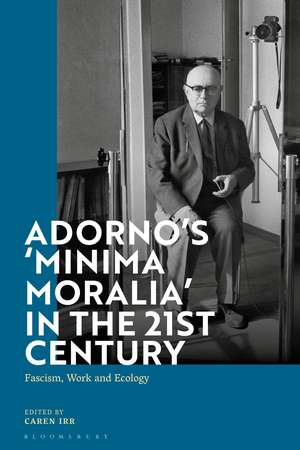Adorno's 'Minima Moralia' in the 21st Century: Fascism, Work, and Ecology
Editat de Caren Irren Limba Engleză Paperback – 28 iun 2023
| Toate formatele și edițiile | Preț | Express |
|---|---|---|
| Paperback (1) | 190.33 lei 6-8 săpt. | |
| Bloomsbury Publishing – 28 iun 2023 | 190.33 lei 6-8 săpt. | |
| Hardback (1) | 538.77 lei 6-8 săpt. | |
| Bloomsbury Publishing – 15 dec 2021 | 538.77 lei 6-8 săpt. |
Preț: 190.33 lei
Nou
Puncte Express: 285
Preț estimativ în valută:
36.42€ • 38.95$ • 30.37£
36.42€ • 38.95$ • 30.37£
Carte tipărită la comandă
Livrare economică 17 aprilie-01 mai
Preluare comenzi: 021 569.72.76
Specificații
ISBN-13: 9781350198937
ISBN-10: 1350198935
Pagini: 200
Dimensiuni: 156 x 234 x 25 mm
Greutate: 0.29 kg
Editura: Bloomsbury Publishing
Colecția Bloomsbury Academic
Locul publicării:London, United Kingdom
ISBN-10: 1350198935
Pagini: 200
Dimensiuni: 156 x 234 x 25 mm
Greutate: 0.29 kg
Editura: Bloomsbury Publishing
Colecția Bloomsbury Academic
Locul publicării:London, United Kingdom
Caracteristici
Demonstrates the connections between Adorno's thinking and contemporary accounts of fascism, the aphorism, work, and ecology
Notă biografică
Caren Irr is Professor of English at Brandeis University, USA.
Cuprins
Foreword by Peter E. Gordon (Harvard University, USA) Introduction1. An Adorno for the 21st Century: IntroductionCaren Irr and and Diana Filar (Brandeis University, USA) Part I Thought After Fascism 2. Minima Moralia and the Contradictions of Post-War PedagogyJakob Norberg (Duke University, USA) 3. Breathtaking Leaps," or from Doorknobs to FascismOshrat C. Silberbusch (author of Adorno's Philosophy of the Nonidentical) Part II The Effects of the Aphorism 4. Gesture, Survival, Utopia: Adorno's Senses of Critique S.D. Chrostowska (York University, Canada) 5. Negative Dialectics, Negative Events: Aphoristic Knowledge as Melancholy Historicism in Theodor Adorno's Minima MoraliaWyatt Sarafin (Harvard University, USA) Part III A Labor Theory of the Present 6. "The Whole of Life Must Look Like a Job": Minima Moralia, Utopian Idleness, and the CapitaloceneClint Williamson (University of Pennsylvania, USA) 7. Self-Preservation, Self-DestructionCaleb Shaoning Fridell (CUNY, USA) Part IV Adorno's Ecology 8. Adorno and Animality After AuschwitzAndrea Dara Cooper (University of North Carolina-Chapel Hill, USA) 9. Living with Damage: Adorno in the AnthropoceneCaren Irr (Brandeis University, USA)Bibliography Index
Recenzii
This compelling collection on Adorno's aphoristic masterwork snaps it into contemporary focus with a range of essays addressing 'damaged life' in the present, from the resurgence of fascism in politics to the colonisation of life by work and the escalation of ecological violence. Adorno, it turns out, has been waiting for us in the twenty-first century.
Minima Moralia is the exquisite entrée into Adorno's thought: intense aphorisms that quietly juxtapose and interweave autobiographical reflection, miniatures of sociological critique, and philosophical analysis. The essays in Filar and Irr's volume are the perfect companion for contemporary readers, pointedly focusing on the bond between the textures of ordinary life and fascism; animality, racism, and anthropocentrism; aphorisms as artwork-like modes of writing that resist the calls instrumental reason and capitalist exchange; and Adorno's "reflections from damaged life" as the agonized adumbration of life in the Anthropocene. Together these essays reveal Adorno as a challenging and urgent contemporary.
Minima Moralia is the exquisite entrée into Adorno's thought: intense aphorisms that quietly juxtapose and interweave autobiographical reflection, miniatures of sociological critique, and philosophical analysis. The essays in Filar and Irr's volume are the perfect companion for contemporary readers, pointedly focusing on the bond between the textures of ordinary life and fascism; animality, racism, and anthropocentrism; aphorisms as artwork-like modes of writing that resist the calls instrumental reason and capitalist exchange; and Adorno's "reflections from damaged life" as the agonized adumbration of life in the Anthropocene. Together these essays reveal Adorno as a challenging and urgent contemporary.
